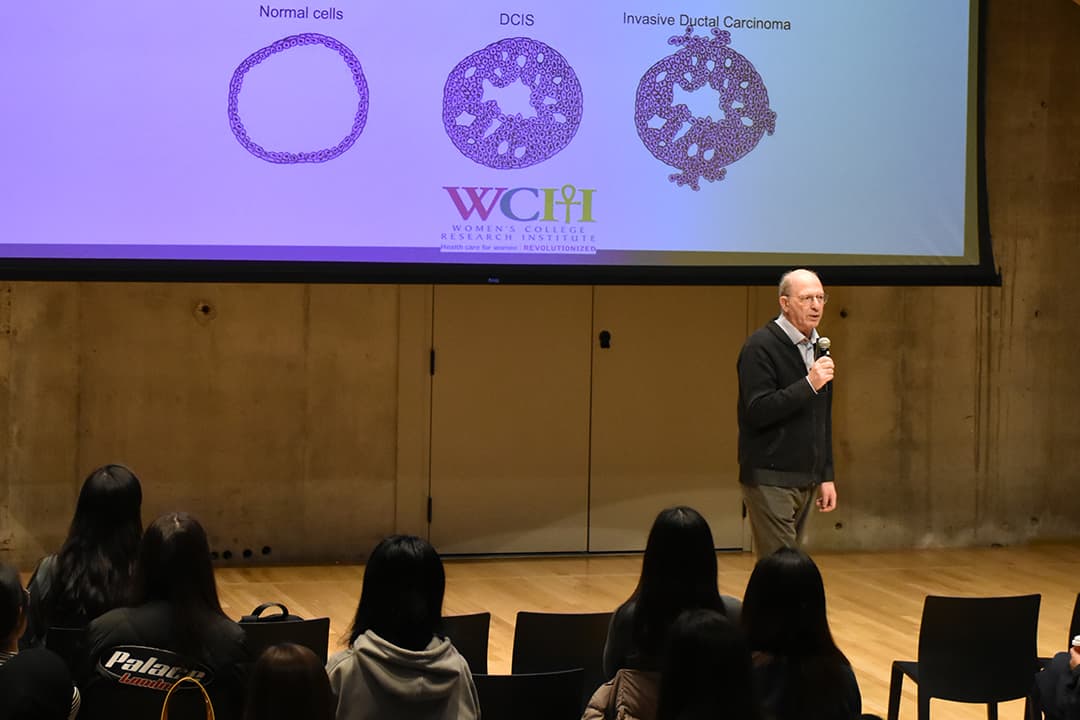On January 26, U of T’s Human Biology Students’ Union (HBSU) hosted Her Health Horizons, an in-person conference dedicated to highlighting emerging areas of research in women’s and reproductive health. It also focused on industry and entrepreneurial work centred around women’s experience of health and in healthcare.
The conference aimed to incorporate diverse perspectives from scientists and industry professionals across Canada, amplify historically underrepresented scientific voices, and emphasize the need for better resource allocation and funding for issues that affect half of the world’s population.
Novel reproductive technology
Interested in the intersection of smart textiles and fertility health? Parnian Majd is the founder and CEO of Fibra Inc., a smart textiles company dedicated to providing an accurate and non-invasive method for understanding fertility cycles and chances of conception through a device in the form of underwear.
The underwear is adorned with conductive fibres and sensors that are designed to collect various types of health data from women like pH levels, heart rate, and other biomarkers to give an estimation of where individuals are in their monthly fertility cycle, and how likely they are to conceive at a given moment.
Fertility status relies on a delicate interplay of various biological, psychological, and environmental factors, such as stress, weight, diet, substance use, and hormonal levels. Additionally, a woman’s relationship with her fertility can also be stressful; societal pressures, the laborious process of fertility testing, uncertainty, and treatment, as well as financial and emotional burdens along fertility journeys can induce more stress. The advent of a smart textile would alleviate some of the stress associated with fertility and conception.
With this in mind, Majd, who graduated with a Masters in Biomedical Engineering from U of T, was inspired by the plethora of possibilities that lie at the intersection of smart technology and women’s health, with both her educational and personal experiences of being a woman paving the way for Fibra Inc.
“Growing up, I often encountered other female individuals… always ha[ving] to sort out any problems they had regarding their reproductive health in private.” Majd explains that women should not have to speak about their health experiences in hushed tones; unfortunately, this is a reality for many women and girls worldwide.
During her passionate talk, Majd highlighted that “it’s a very huge problem that we lack a good and reliable database when it comes to women’s health,” and that this gap in available information and funding is reflected in other fields, namely, gendered cardiovascular health. These issues inspired Majd to start Fibra Inc. and empower women as they navigate the joys and uncertainties of fertility.
The politics of gendered healthcare
How individuals experience their health is not just restricted to pure physiology and medicine. Politics and culture also greatly affect women’s health. Jenna Quelch is a PhD student in the Department of Political Science at U of T with a keen interest in how politics and policies shape the landscape of female and reproductive healthcare.
In her talk, Quelch asserted that “[healthcare] is a reflection of power, it is a reflection of race, of culture… and it is reflective of intersectionality and the oppressive regimes that exist… Healthcare is inherently political.” Quelch’s PhD work delves into how definitions of what constitutes healthcare differ across provinces and territories, and how these differences are reflected in the policy decisions and quality of care women and other gender minorities receive.
Quelch shows that someone’s geography can be a greater predictor of their health outcomes than the actual medical issue they are facing. For instance, the province or territory a person lives in can determine whether they can participate in and receive financial support and specialized care for in-vitro fertilization — an alternative conception method that fertilizes an egg and sperm in a lab and implants them in the uterus to cause pregnancy. Even the age at which the law considers it acceptable for a fetus to be aborted differs across Canada depending on different provinces’ and territories’ policies.
Quelch remarks that even though Canadians should be proud of their healthcare, “there is [a] very intense variation in the access of services for gendered health.”
In her talk, Quelch explained how the definition of deservingness by various governments and policy-making bodies in Canada determines how gendered health issues are treated by different parts of Canada’s healthcare infrastructure. “My hope with this research is to… acknowledge that healthcare, indeed, is powerful, it is reflective, and it is inherently political.”
Neuroscience, aging, and memory
The world of neuroscience and sex-based research is only just beginning to unearth all the ways in which female and male brains may differ.
Female brains are sensitive to estrogen-based hormonal changes throughout the body, which can result in different cognitive effects between men and women, especially in old age. The majority of women experience menopause between the ages of 45 and 55, where their menstrual cycle stops and their estrogen — a predominantly female sex hormone — decreases. This decrease strongly correlates with poor memory performance and cognitive decline in female brains.
As a consequence, scientists believe that estrogen is protective against memory and cognitive deficits common with aging. “Estrogen and menopause are more than just reproductive health,” claims Sara Ahmed, an MA candidate in clinical psychology at Toronto Metropolitan University , at the conference. She continues, “It is also brain health, especially because as women get older, they are at an increased risk for memory disorders like Alzheimer’s compared to men [of the same age].”
The HBSU’s Her Health Horizons conference wove together a diverse range of perspectives on the status of female and reproductive health, emphasizing emerging areas of research and how industry innovation is revolutionizing how women and individuals with otherwise marginalized gender identities experience their reproductive health moving forward.



No comments to display.